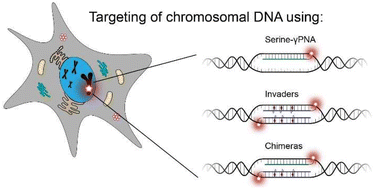Serine-γPNA, Invader probes, and chimeras thereof: three probe chemistries that enable sequence-unrestricted recognition of double-stranded DNA†
Abstract
Three probe chemistries are evaluated with respect to thermal denaturation temperatures, UV-Vis and fluorescence characteristics, recognition of complementary and mismatched DNA hairpin targets, and recognition of chromosomal DNA targets in the context of non-denaturing fluorescence in situ hybridization (nd-FISH) experiments: (i) serine-γPNAs (SγPNAs), i.e., single-stranded peptide nucleic acid (PNA) probes that are modified at the γ-position with (R)-hydroxymethyl moieties, (ii) Invader probes, i.e., DNA duplexes modified with +1 interstrand zippers of 2′-O-(pyren-1-yl)methyl-RNA monomers, a molecular arrangement that results in a violation of the neighbor exclusion principle, and (iii) double-stranded chimeric SγPNAs:Invader probes, i.e., duplexes between complementary SγPNA and Invader strands, which are destabilized due to the poor compatibility between intercalators and PNA:DNA duplexes. Invader probes resulted in efficient, highly specific, albeit comparatively slow recognition of the model DNA hairpin targets. Recognition was equally efficient and faster with the single-stranded SγPNA probes but far less specific, whilst the double-stranded chimeric SγPNAs:Invader probes displayed recognition characteristics that were intermediate of the parent probes. All three probe chemistries demonstrated the capacity to target chromosomal DNA in nd-FISH experiments, with Invader probes resulting in the most favorable and consistent characteristics (signals in >90% of interphase nuclei against a low background and no signal in negative control experiments). These probe chemistries constitute valuable additions to the molecular toolbox needed for DNA-targeting applications.



 Please wait while we load your content...
Please wait while we load your content...